Trust me, I should know. I’ve learned first-hand how hard it can be to decide what to focus on as a blogger (and actually start a blog in the first place). That’s where the right blogging tips & advice (from the world’s most successful bloggers) comes into play here today.
Improving your blog writing skills? Building a social media following? Guest posting? Networking? Commenting? Re-publishing your content to Medium? Answering questions on Quora? Testing out ways to make money from your blog? Start using all the top AI writing tools to scale your content publishing?
There are so many blogging tips and advice floating around out there about what you should be doing, that it’s easy to just get too overwhelmed and wind up doing nothing at all.
The good news is that there are plenty of straightforward, practical ways to successfully grow your blog. But, remember that you shouldn’t try doing everything at once, especially when it comes to driving traffic and learning how to promote to your blog. In this comprehensive guide of the best blogging tips advice, I’ve brought together the 40 of the world’s top bloggers to share their take on what you should focus your blogging efforts on today.
To make sure this guide is actionable (rather than overwhelming), I’ve arranged all of these blogging tips and advice into distinct sections spanning the blogging journey—and given you a quick summary right at the top of each section… so you can read up on the advice and jump straight into the actionable steps you need to take to grow your blog.
40 Blogging Tips and Advice from Top Bloggers for 2023
- Blogging Tips & Advice Part 1: Launching Your Blog
- Blogging Tips & Advice Part 2: Getting More Readers and Subscribers
- Blogging Tips & Advice Part 3: Making Real Money From Your Blog
- Blogging Tips & Advice Part 4: Leveraging Powerful Tools and Techniques
Disclosure: Please note that some of the links below are affiliate links and at no additional cost to you, I’ll earn a commission. Know that I only recommend products and services I’ve personally used and stand behind. When you use one of my affiliate links, the company compensates me, which helps me run this blog and keep all of my in-depth content free of charge for readers (like you).
Let’s start breaking down our best blogging tips and advice, section by section.
Blogging Tips & Advice Part 1: Launching Your Blog
Don’t wait, start right now. This is by far the most often recited amongst the blogging tips and advice that nearly every top blogger from around the world has to share with us today (for good reason).
And it makes perfect sense. It’s easy to give yourself the excuse of waiting for the perfect moment to start your blog, or to keep pushing off that launch date until you can learn everything you need to know about blogging. “No sense in starting until I can do things just right…”
But here’s the truth—you’ll never feel completely ready to start.
It’s only through taking action and starting right now (no matter how small your early steps are), that you’ll ever see the benefits of just how much your work can pay off as it compounds over the course of days, weeks, months and years.
In order to achieve your ultimate goal of building a profitable blog, you must heed these foundational blogging tips. So if you haven’t already launched—get your blog started today. There will be unknowns to learn more about, but that’s ok.
Figure out what kind of content you can offer to an audience you’re personally connected with, get started and keep taking consistent steps that move your blog forward each day.
Ready to Start Your Blog Today?
Check out my ultimate guide How to Start a Blog (on the Side) that’s been featured on Forbes, Inc and Entrepreneur.
Now, let’s dive into our first section of blogging tips and advice, geared around the launching phase.
1. “Set realistic expectations, build smart habits that ladder up to your goals and embrace a mindset of experimentation.” — Ryan Robinson (that’s me! 👋)

There are plenty of reasons why people get into blogging. But if building a real, sustainable business around your blog is a key blogging goal you hope to one day achieve—then it’s important to have the realistic expectation that it most often takes several months (or even 1 to 2 years) to begin generating over $1,000/mo in blog income—if it’s your first time launching a blog. It helps to have a clear blog business plan, too.
Here on my blog, I now reach 500,000+ monthly readers and generate well into the six-figures in revenue. But it’s taken me nearly 6 years of hard work and showing up every day along with holding a full-time job, in order to get to this point.
My most impactful blogging tips and advice I can offer, is to create habits that set yourself up for success.
An example of a successful habit that most top bloggers share in common, is that we create regular, recurring blocks of time on our calendars to spend on key activities like writing, doing keyword research, publishing and promoting our content. If you don’t physically block off at least a few hours to work on your blog each week—whether it’s in the mornings before your day job or during the evenings after putting your kids to bed—you won’t make progress quickly enough to stay engaged over the long-term.
And even still, everything about blogging today is constantly changing. There are tons of things I wish I knew before starting a blog. From Google search algorithm updates to ever-evolving Facebook policies, the emergence of new social networks and so on, you’ll need a willingness to adapt and experiment regularly with your blog. I’m still learning new things every single day—whether it’s improving my ability to drive traffic to my blog from new sources, to doing a better job of writing blog posts that help my readers, or learning about new ways to make money blogging… I’m always reinventing my blog for the better.
Use My Free Keyword Research Tool
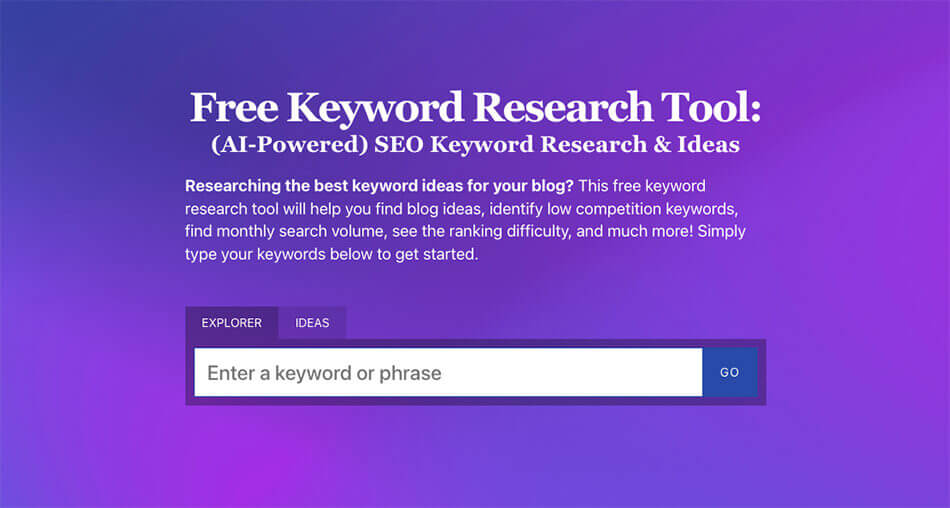
Try my free AI-Powered Keyword Tool to get dozens of research-backed ideas for keywords & topics to write about on your blog today.
2. “Prepare to make big sacrifices and spend a lot of time on getting your blog meaningful traction.” Michelle Schroeder, Making Sense of Cents

When I asked Michelle to share her biggest piece of blogging advice with me on a recent episode of my podcast about how she consistently earns well over $100,000/mo from her blog, she echoed similar sentiments when it comes to just how much work has gone into getting her blog to where it is today. When it comes to sacrificing time in order to grow her blog, here’s Michelle’s best blogging tips and advice:
“The biggest sacrifice I’ve had to make over the years has definitely been using pretty much all of my time towards my blog, especially early on. In the beginning, I was spending anywhere from 20 to 40 hours a week on my blog, when it was just a hobby—not even a true side hustle yet. When it became a serious side hustle, I was spending 40 hours a week on it.”
“Eventually, when I first left my day job to blog full-time, I was spending anywhere from 40 to 100 hours a week working hard to get more traction. Now I’m trying to keep my work to a little less than 40 hours a week, but I’m still sometimes spending 100 hours on a week on it.”
3. “Treat your blog like a product or a brand. How can you make it stand out from the crowd?” — Brian Dean, Backlinko

Brian and I recently sat down to chat on my podcast about how much blogging (and SEO) has been changing over the course of this year. And while we got into all kinds of tactical blogging tips and advice about what it takes to create top-ranking blog content, he also zoomed to talk on a much higher level about how to stand out from a sea of competitors also blogging about the same topics as you are. Here’s what Brian had to share:
“The first thing I’d focus on when launching a blog, is positioning. If you jump into the tactics without nailing this part, it’s going to be a huge struggle going forward. Look at your blog like a product or a brand. What’s going to make your blog different from what’s already out there?“
“If you’re launching a fitness blog, why would someone read your fitness blog? Maybe you teach moms. Maybe you teach SaaS founders. Maybe you teach people that are built, how to get more built. Or maybe you teach people that used to be strong, how to get back into shape again. The point is, you want to have a positioning that’s unique and helps you stand out. Then you can create content that’s amazing and backs it up.” Plus, if you’ve chosen a topic you’re passionate about, you’ll have a much easier time writing faster and creating more impactful content for your readers.
4. “Devote the early part of the day to your blog.” – Pat Flynn, Smart Passive Income

In one of my earliest podcast episodes, Pat and I really dove deep into what’s helped him to grow his blog, Smart Passive Income, to such impressive six-figure (monthly) levels of income through a combination of everything from blogging courses to podcast sponsorships, blogging books, affiliate programs, SaaS products, physical products and other proven ways to make money blogging. Pat’s even gotten into the world of podcast hosting with his company, Pressable.
His most helpful blogging tips and advice? Working on his blog in the early mornings—and giving himself the best possible hours in his day. Here’s what he says:
“Time stretches add up. If possible, I’d recommend putting time in for yourself during the morning, before you do anything else, before you give your time to somebody else and their dreams that they’re building—give it to yourself first. This is similar to a personal finance tip that a lot of people may have heard of before: pay yourself first.”
“What most people try to do is, they set an alarm for when they have to go to work, then they work, and they come home, they’ve got to spend time with the family, and then the family goes down to bed, and then you have thirty minutes or an hour at the end of the day to work on your thing. But you’re already exhausted. You’ve already used up your think tank. There’s just no good decision-making going on.”
“But you can flip it around, wake up a little earlier and devote that early time to yourself. I wake up at 4:30 in the morning and I always read, meditate and I get my most crucial work done before the kids are up. And it’s the craziest production I’ve ever had in my life. Even if it’s a half-hour, devote that early part of the day to yourself.”
5. “Figure out what you personally stand for and jump straight in. You can hone your voice as you go.” – Gaby Dalkin, What’s Gaby Cooking
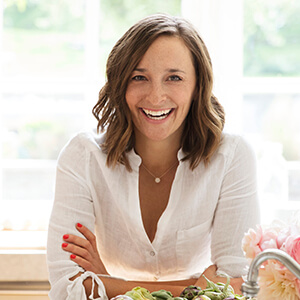
Gaby Dalkin has one of the most fun blogging journeys I’ve gotten to follow along with over the years (and talk about) on my podcast. Formerly a personal chef for singer Jessica Simpson, Gaby started food blogging on the side of her personal chef work and slowly amassed a loyal following or readers who tuned in for her recipes and amazing photography. More recently, she’s gone on to publish multiple books, launch several product lines with Williams Sonoma and more.
Here’s the best blogging advice Gaby has to share for those that want to follow in her footsteps this year:
“I didn’t do this for the first three years, and I really wish I had. Figure out what it is that you stand for, what message you want to share, what you want your story to be. Make sure it’s authentic—and then go for it.“
“I find a lot of people are scared to start a blog or whatever they’re trying to do, and I think there’s something to be said about just jumping in headfirst and figuring out what your voice is, and you’ll grow and develop along the way. But you’ve got to start somewhere.”
6. “Even if you have zero followers today, start with the people you know, learn from them and grow from there.” – Chris Guillebeau, Bestselling Author of The $100 Startup and Side Hustle

I recently had the pleasure of sitting down with this prolific blogger and multi-bestselling author to talk about how he’s used the vehicle of side hustling to grow his writing career (and blog) into what’s become a very powerful, lucrative personal brand that keeps him booked solid with meaningful work, year-round. When asked about the best blogging tips and advice he’d give, here’s what Chris had to share:
“No plan survives contact with the battlefield. You have this grand vision—maybe you’ve even worked on it for a long time, and then you put it out, and it’s probably going to change. You’re going to get feedback you didn’t expect, you’re going to see a response you didn’t expect, it might be positive, it might be negative, or maybe some of both.”
Even if you have zero followers today, here’s what I’d say: You still have people in your life. Pretty much everybody has a Facebook account, friends, people you went to school with. Everybody has contacts and second-degree contacts. Start reaching out to those people when you’re first starting your blog—not pitching or selling, but saying, ‘Hey, I’m making this thing. Do you want to check it out? Do you know somebody it might be good for?’ And that’s exactly how I started working on my first book, The Art of Non-Conformity, which became the basis for my blog as well. Start with who you know and try to grow from there. Focus on the core message and don’t get distracted, but be open to evolution as things go along.”
7. “Ask yourself what you have of value that you can bring the world through your blog.” – Rob Palmer, World’s First Blogger

A lot has changed in the 25+ year history of blogging since Rob authored what’s (arguably) the first public blog post to hit the Internet back in 1993. One thing he says still holds true? The immense power of creating unique, helpful content for your readers.
When asked to share his best piece of blogging advice, here’s what Rob had to say:
“The key thing to making a splash in your blog niche, is having very high quality content. You need to have your own perspective. You need to figure out what you have to offer—what makes you unique. What do you have of value to bring to the world? Once you’ve figured that out, you can deliver quality content and products to your audience.”
“Google is always looking for the best piece of content for a particular query. It’s the same with social media: It’s the great content that gets shared. Maybe ten years ago, you could fake it, you could have a dodgy product and you could still make money… but I don’t think that’s easy to do today. You’re much better off giving something really useful to your audience and building a meaningful relationship with your community.”
8. “Your first blog posts won’t be perfect, but you have to start somewhere and grow from there.” — Shane Barker, ShaneBarker.com
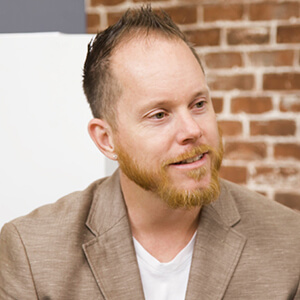
Shane is one of the most well-established digital marketing consultants I’ve gotten to know over the past several years. He’s worked with clients like Inc Magazine, Forbes, Social Media Examiner, CreativeLive and more—to create compelling content that drives traffic and increases revenue for their brands.
He’s also a pro when it comes to growing his own blog that reaches hundreds of thousands of monthly readers. Here’s what Shane had to share when asked about his best blogging tips and advice:
“The main way I get my leads is from inbound marketing. We invested in content seven or eight years ago, and I still have that original blog post I wrote back then. It’s an absolute piece of doo-doo, it was terrible! I actually show it to my students at UCLA. I say, Look at this blog post, and they’ll tell me it’s terrible, but I’ll reply… the difference is, I started.”
“And that’s what most people don’t do. They say, I don’t want to do video because I might look weird. Well, I can promise that your first video is going to look terrible, and your first blog post is not going to be awesome either… but you just have to do it. You have to start somewhere. We invested in content marketing, and we’re now at a point where we get a great amount of traffic and a good number of leads from my website on a daily basis.”
9. “Don’t blindly follow the blogging tips and advice you hear. If something you’re told conflicts with what’s important to you, stick to your own convictions.” — Anna Vital, Adioma

Before Anna launched her infographic design tool, Adioma, she rose to fame as a designer and blogger that crafted some of the most viral infographics ever to be shared in the tech startup and venture capital spaces.
From visually documenting the founder journeys of people like Elon Musk, Mark Zuckerberg and Jeff Bezos, to landing paid projects doing design work with brands like Google, Legal Zoom and Cisco, Anna’s learned a thing or two about how to use her blog as a platform to create a business. Here’s her best blogging tips and advice:
“Don’t worry about implementing all of the blogging tips and pieces of advice you hear. I read too many blogs, got a lot of advice about how I should do something… but at the end of the day, it’s your passion, your personality, that drives what you’re going to do. If some of that blogging advice conflicts with what’s important to you, then you’re not going to be able to use all that passion to drive your project forward.“
“For example, one piece of advice I got for my startup, was not to worry about how my product looks, just make sure it functions. But for us, we’re a graphic design and infographic tool, so it totally makes sense to make it look as beautiful as possible. Beauty drives me. That’s what I love. I love looking at something that’s beautiful and I love making beautiful things. So even though for many other startups, this advice might be totally okay, for us, making beautiful things was a must—and that’s what drives us.”
10. “Figure out what really sets you apart from the other bloggers in your niche.” — Selena Taylor, Find Us Lost

Selena and her husband Jacob, the duo that started the travel blog and Instagram account, Find Us Lost, have amassed a following of over 175,000+ people tuning in to their regular travels (and planning guides) as they criss-cross the globe.
Since launching their travel blog just a couple of years ago, this couple has used their skills to book sponsored trips with world-renowned travel brands and monetizes their audience in win-win ways through affiliate partnerships and sales of their photo-editing presets. When asked to share her best piece of blogging advice, Selena says:
“The sooner you can figure out what sets you apart, the more you’ll succeed in what you’re blogging or posting about. There’s a tendency for a lot of people to feel very overwhelmed by the competition that’s already out there—and I still feel that pressure every single day. But as soon as I get caught up in that, it really sets me back. So it’s about making sure that I’m keeping in mind what makes us unique, and what’s our content special.”
“Anyone who’s just starting out just needs to ask themselves that same question: how soon can I figure out exactly who I am and who I want to portray with this brand? Once you’ve established that and you’ve paved the way, people will start to see that.”
11. “You don’t have to reinvent the wheel, learn how others have become successful and apply those lessons to your own niche.” – Grace and Silas Moser, Chasing Foxes

Another husband and wife team, Grace and Silas Moser behind Chasing Foxes, went from starting their blog on the side of full-time jobs, to now reaching more than 2 Million monthly readers and well over $20,000 in revenue during their peak months—largely by tapping into the vast audience that spends hours on Pinterest every day.
When asked to share their best blogging tips and advice, here’s what they had to say:
Grace shares, “Create a number of blog posts before you launch. We created around 40 and published those on our blog when it first launched. If you want to get going right off the gate and have lots of viewers right upfront, it’s very important to create that content beforehand to keep them engaged.”
“I would definitely put the work in before you launch, so that when you do launch and your blog is live, you’ll feel good when you start putting some posts out onto Pinterest and begin driving in some traffic.”
To add to that, Silas shares, “Make sure you study people that are good at whatever you’re doing and figure out what works for them. Then you can determine how to apply those blogging lessons in a way that’s going to fit with you and what’s sustainable & interesting to you.”
“You don’t have to reinvent the wheel. Other people have already done it and they’ve done it successfully. There are successful bloggers out there. They’re not freaks, they’re not unicorns, they have real tactics and strategies… you can learn from them and apply it to your own niche too.”
12. “Ask yourself what you’re able to do for your readers, that someone else can’t.” — Chase Dimond, Boundless Labs

Chase and I went to college together, and he’s been a busy entrepreneur since graduating, including his time co-founding the travel newsletter and Instagram account bearing the same name: The Discoverer (which now boasts over 1 Million followers across their accounts). Chase was instrumental in the meteoric growth of that content-focused company, and he’s since gone on to launch his own eCommerce growth agency based in Southern California, called Boundless Labs. Chase is well-versed in using eCommerce website builders, too.
When asked to share his biggest piece of blogging advice when it comes to growing a community, here’s what Chase had to say:
“It starts with first having a really important mission, and perhaps some kind of competitive advantage. What are you able to do that someone else can’t? That could be something as simple as even acquiring leads at a cheaper cost. Or it could be more defensible like delivering a better experience or having a stronger brand.”
“Begin by figuring out the platforms that your ideal readers are on, and figuring out the ways you can reach them there. So on Instagram, you’d identify people who are using certain hashtags. If they’re using #travel or #discover in their own photos, you know that they’re interested in travel—so you could comment on their photo, you could DM them, or if they have an email in their bio, you could send them a full email (a great approach to authentic blogger outreach).”
“There are a ton of ways to reach people on social and just have initial conversations like ‘Hey, this is what I’m working on, I’d love your 100% honest feedback.‘ If you already have content, a product or service that you can give them as thanks for their time, that’s awesome. Trading whatever your blog has to offer in value to a potential reader for their feedback makes sense.”
13. “There’s never a perfect time to launch a blog or jumpstart a writing career, you just have to start.” – Jeff Haden, Inc Magazine’s #1 Contributor
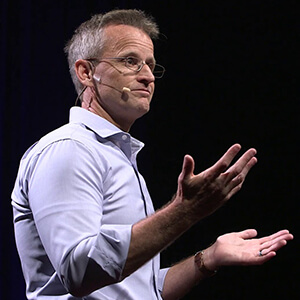
Long before Jeff rose to become Inc Magazine’s top contributing writer and pen some of his own books, he worked in the publishing industry and moonlighted as a freelance copywriter. He eventually made his way into ghostwriting for CEOs, startup executives and even ghost-wrote some of the top business books out there today.
As a seasoned writer, I asked Jeff to share his blogging tips and advice when it comes to building confidence in your writing and getting your blog off the ground.
“You just have to start. It’s like deciding to have a baby—you’ll never really think you’re ready to have a baby. And you’re never going to think you’re ready to start your blog, or whatever it is you think you want to start.”
“Experience comes from actually doing something, and you can’t gain experience until you do. Qualifications don’t really matter. Nobody cares. Once you produce something, no-one cares about the qualifications you have behind it. They care about whether it’s good. So, get started, gain experience, come up with something decent, put it out there, learn from it and work to continually get better.”
14. “Guest posting is the best thing I’ve ever done for the growth of my blog.” – Jeff Goins

Jeff Goins, the blogger and best-selling author of five books including The Art of Work and Real Artists Don’t Starve, has learned a thing or two about blogging in his more than 15+ year career as an online writer.
During our recent interview for my podcast, I asked him to share his blogging tips and advice when it comes to establishing yourself and quickly building an audience for your blog.
“My biggest source of traffic in the early days of my blog, was other people’s blogs. I’d write lots of guest posts. And in 2011, I wrote an article every day for my blog… and 100+ other articles for other sites as guest content.”
“Guest posting is the best thing I’ve ever done for the growth of my blog. I got my first 1,000 subscribers from word-of-mouth referrals and slowly picking up momentum from friends and family. Guest posting is what helped me go from 1,000 to 10,000 subscribers by creating relevant lead magnets to go along with the content I was promoting in my guest content.”
“Every time I published a guest post, I’d get anywhere from a handful of subscribers to several hundred. It worked so well that I just kept doing it for years and it’s continued to pay off.”
15. “Stop planning and spending hours thinking about how to get your blog started. The best thing you can do is start today and improve as you go.” – John Rampton, Calendar.com
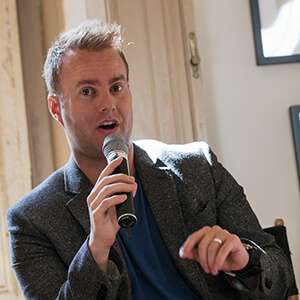
A serial entrepreneur at heart, John Rampton is behind several successful websites, products and software tools—including Calendar, Due, NatureBox and is an active partner in a Palo Alto, California based private equity firm that invests in growing startups. Throughout his career that includes writing for publications like Entrepreneur, Inc and Tech Crunsh, John has always used high quality content to drive readers to his web properties—and he’s done it very well.
I asked him to share his best blogging advice to those who are just getting started down their blogging journeys today. Here’s what he had to say:
“Start. Just start. Stop planning, stop thinking about it. Just start. It doesn’t have to be perfect, it doesn’t need to have all the bells and whistles. It can be the crappiest website in the world today—but starting is the best step you can take.” Note from Ryan: This doesn’t mean you should ignore tools like a blog planner during your early days to build the right habits as your site grows.
“When I started Due, people really liked our product in theory. But before our product even really worked well, we had over 10,000 customers trying it out. It worked, and people were like, ‘Oh, we love this,’ but it didn’t work as well as we knew it could. We patched things together, but we made it work and focused our efforts on getting 10,000 to 11,000 customers before our product finally felt good.”
16. “Publish only the best content you’re capable of.” – Kyle Byers, Growth Badger

Kyle is the founder of the prolific content marketing blog, GrowthBadger, where he’s gone from zero to over 50,000 readers in less than 12 months of blogging on the side of his advertising agency—all as an experiment to see how quickly he can build a profitable blog.
Since he’s already killing it so quickly with his blog, I asked Kyle to share with us his best blogging tips and advice:
“My #1 piece of blogging advice is to worry less about publishing as often as possible—and more about publishing the best work you can. There’s more competition now than ever, and study after study shows that comprehensive, in-depth content performs best.”
“The world doesn’t need another 5-minute listicle. You can do better than that, and you’ll be rewarded for it if you do.”
17. “Begin with very small, attainable goals and commit to incremental steps that’ll help you build momentum over time.” – Steli Efti, Close
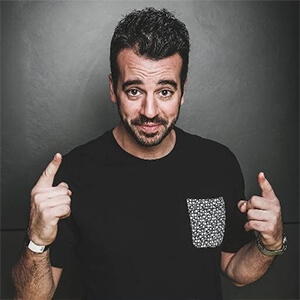
During our interview and throughout the years I’ve gotten to work with Steli at Close, he’s cultivated a major bias toward action when it comes to launching products, releasing new features, kicking off marketing campaigns and even publishing new content on the blog. His proactivity with content creation has helped the Close team reach millions in annual revenue for their CRM—driven largely from content that ranks high in organic search.
When asked to share his best blogging tips and advice for those trying to gain traction on the side of their day jobs, here’s what Steli has to say:
“If you want to start a blog, consultancy or even a startup on the side, you just need to get started and have very small blogging goals in the early days. The reason why people don’t start their side hustle, is because they think it’s going to take a lot more time and a lot more effort to start it, or they set goals that are really demanding and way above their current capacities—either in skills, experience, time or money. Then they set themselves up for failure: they do a bunch of stuff in the first month and burn themselves out, or they never start because they’re so daunted by the task.”
“So get started, and think more about how you can spend 15 minutes every day on this. How can you do this for the next four years? And then believe in the process. If you spend 15 – 20 minutes, seven days a week, for four years—in four years from now, you’re going to know a lot more. You’re going to be doing something.”
“Think in small, incremental steps that build momentum. If you start now, in two or three years from now, you might be in a really great place. If you’re faster than that, awesome. But if you’re not – you know how many people have been thinking about starting a side hustle for the last ten years of their life? If they’d just started four or five years ago, they’d still be worlds apart from where they are now.”
18. “You have to invest in yourself, have faith, take the leap and figure it out.” Alex Nerney, Create and Go

A fascinating success story filled with plenty of ups and downs, Alex Nerney met his future business partner, Lauren McManus, on Tinder back in 2014. After starting to date, they began experimenting on different types of blog-based online businesses. They soon grew a successful food blog and slowly pivoted over to teaching about what they’ve learned in the world of blogging with what’s since become their main site, Create and Go—where they reach hundreds of thousands of new bloggers every month.
When asked about what his best blogging tips and advice are, here’s what Alex had to share:
“The best investments I’ve ever made when it comes to growing our blog, have been in myself. Quitting my job, and having the faith that we would figure it out. We had to make this decision… what if we just quit? What if we went all in? It was an investment in ourselves. We’re smart enough to figure this out, we just need more time in order to do it.“
“That was the smartest investment we ever made. As soon as we quit, we doubled our revenue every month for the first 6 to 7 months of blogging.”
Blogging Tips & Advice Part 2: Getting More Readers and Subscribers
If you want to get more readers and email subscribers on your blog, you need to forge real connections with people.
That doesn’t just mean writing great blog content and cracking the code to unlocking traffic from Pinterest (though both of these strategies can certainly be a part of your competitive advantage). In order to really attract and retain an audience, you need to lean hard into your strengths and step outside of your comfort zone to diversify your traffic sources.
Evaluate whether or not there’s a demand for video content on YouTube within your niche. Try meeting people in real life at industry conferences or local meetups. Determine if your readers spend time on Quora and dedicate 30 minutes to answering relevant questions in your field.
Anything you can do to make your connections with readers more real, the more likely they’ll be to spread your content by word-of-mouth marketing. And that’s how you create a movement.
Now, we’re highlighting blogging advice that’s specifically geared toward growing your audience.
19. “Realize that every time you’re communicating, you’re selling something. And you have to add value or nobody’s going to listen to you.” – Hiten Shah, Co-Founder of FYI, KISSmetrics and more.

Serial startup founder, Hiten Shah, has grown several software companies on the back of his ability to create long-form, high quality blog content that’s designed to drive thousands of targeted readers into his products from search engines like Google. He’s truly mastered the art of community building.
Based on his decades of experience in content marketing, here’s Hiten’s best blogging tips and advice he has to share with new bloggers:
“What I realized early on is that every time you’re communicating, you’re selling something. People feel like that’s so dirty because selling implies that you want something. What I mean is, when there’s an audience consuming your content, you’re selling something. You may not be selling anything you want money for right away, but you’re selling your knowledge and advice. It’s your job to deliver.”
“For me, it’s about this whole idea that every time you communicate, there’s something that you’re trying to get someone else to think. You’re trying to get them to think differently. You want to add value. For me, it has everything to do with adding value—not just selling to my audience.”
“As I started trying to sell to my audience, it just clicked for me—if I’m not adding value, nobody’s going to listen to me.“
20. “Create meaningful connections with your audience.” – Mariah Coz, MariahCoz.com

Mariah is one of the most successful online course creators (and marketers) that I’ve gotten to sit down with and interview on my podcast. She’s used her blog as a platform to grow a seven-figure annual business that teaches her audience how to master everything from email list building, to delivering webinars, launching courses and more.
When I asked her about her best blogging advice, here’s what she had to share:
“I’m deeply introverted, but when I’m doing a webinar, I’m still alone in my room. I’m presenting to maybe 1,000 people who are watching—but I’m still chilling in my room. It’s not like I have to go to a conference and talk to people.”
“Even if you’re an introvert, think about how you can still create connection with your audience. I’m the biggest introvert you’ll ever meet. I’m so shy in person, but I can do a really good webinar and talk on video. That’s something you can start to build as a skill—getting over that fear.”
“I used to be terrified of doing any webinars or any live-streams, but once you can get over that fear, you start seeing what’s more important. The fear isn’t important. The good part is when you get to connect with your audience: when they’re asking you questions and they’re saying thank you for coming and sharing this today. That’s when you realize it was all worth it.”
21. “Go out into the world and build real relationships with people in your industry.” – Tommy Griffith, ClickMinded

The mastermind behind the ClickMinded SEO and marketing training courses, Tommy originally started his blog and training series as a side project while working a full-time job with companies like PayPal and Airbnb. After picking up some initial traction and building in-person relationships with hundreds of students in the San Francisco Bay Area, he took his courses online and has been scaling his business ever since.
When asked to share his best blogging tips and advice with those that want to follow in his footsteps and grow an online audience, here’s what Tommy had to say:
“I have two favorite strategies for growing my blog right now. The first is anything that requires my to get out of the basement: offline, meet-up types of things. My first 100 users came from Meetup events. People have all kinds of tactics that they’re willing to run from their laptops, but no-one wants to go out into the real world and shake hands with people.“
“I also like using your email list. A lot of people don’t look at this synergistic relationship between all the digital marketing channels. You can leverage your email list for link building: getting eyeballs on it and getting the right people to see it can be extremely valuable.”
22. “Stick to a schedule. Don’t worry so much about the individual results you get in the early days, focus on creating habits that set you up for success in the long run.” – James Clear, JamesClear.com
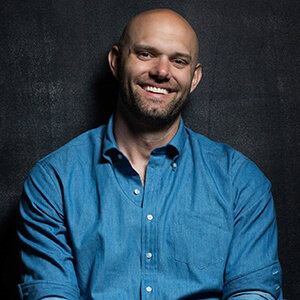
James rose to fame as a prolific thinker, writer and blogger in recent years, sharing extremely thought-provoking ideas (and solutions) on everything from how to become more productive in your daily life, to decision-making, creativity, self-improvement and more. His courses and regular email updates reach more than 400,000 people and his recent book, Atomic Habits, became a New York Times Bestseller.
His best blogging tips and advice for those just getting started today?
“The only reason I’ve been able to have a successful blog and build a business around it, is because I published on it twice a week for three years. It really is all about the consistency.”
“Think about the type of business that you want to build around your blog. From a higher-level standpoint, start with what you want your typical day to look like. How do you want to spend your time? Once you’ve done that, and decided which niche topic area you’re focusing on, then the key is that every job (especially blogging) has some repeated stuff you need to be doing.”
“Maybe it’s sales calls you need to be making, maybe it’s content you need to be creating—whatever that is, set a pace that you can sustain. Maybe it’s two articles a week, or ten sales calls a day. Focus on setting a pace you can sustain, then stick to your schedule. Don’t worry so much about the results in the short-term.”
“In the beginning, it didn’t matter if I thought an article was good or bad, if the response to it was good or bad, if it was long or short—all that mattered was that I published an article every Monday and Thursday. The schedule was non-negotiable. Everything else that happened could be adjusted. If you stick to that, you’re going to learn a lot—and if you learn a lot, you have an opportunity to get better at it.”
23. “Examine your competitor’s content and look for ways you can differentiate yourself to provide more value to readers.” – Garrett Moon, CoSchedule

Co-founder of the massively popular marketing software and editorial management tool suite, CoSchedule, Garrett is also the author of the 10x Marketing Formula, his book that breaks down his approach to the content marketing philosophy that’s helped he and his team to build a massive brand and attract thousands of paying customers in a competitive industry.
Naturally, as the maker of tools for bloggers and content marketers, I asked Garrett to share with me his single best piece of blogging advice when I had him on the podcast. Here’s what he had to say:
“As founders, we tend to think in these simple frameworks that create repeatable success and repeatable results. I think it’s really helpful to people starting businesses to simplify it in that way. One of those frameworks [for us] was competition-free content, which is about starting to see marketing efforts through the same lens that you’d see the product that you’re creating.”
“When you build a product, you’re thinking about, who are my competitors? Who’s building a similar product to mine? What are their key differentiating factors from us? Are they really focused on speed, are they really focused on simplicity, are they really focused on complexity and customization and high prices? What’s our angle – what’s going to be the thing that differentiates us as a product?“
“In marketing, in particular when you start to get into the realm of creating content, as a marketing channel, you have to realize that your content is in competition with other content. Now that content may be being produced by your top competitors.”
“Competition-free content is about using this whole process to identify the things that your competitors are doing, the things that they’re using to market themselves, what types of content they’re creating, how long is that content, what is that content doing for its audience (is it solving a problem, is it methodology, is it actionable). There’s a lot of different ways you can look at it. You’re starting to find ways to have your marketing differentiate itself from what your competitors are doing.”
24. “Don’t wait for your readers to come to you. Find where they’re spending time, reach out and cultivate those relationships.” – Poornima Vijayashanker, Femgineer

Poornima is the blogger and software engineer behind Femgineer, a platform that began back in 2007 as just a blog for her to write about her adventures running engineering teams for tech startups in the San Francisco Bay Area. As her audience grew over the years, Poornima began branding out into offering online educational resources to those that wanted to learn how to break into a career as a software engineer.
When offering up her best blogging tips and advice when it comes to attracting & retaining an audience, here’s what she had to say:
“It’s all about consistency. If you keep publishing content and find some networks or resources like Medium (or other places) to promote your material, then that’s a great place to start getting your first five to ten followers. And then it’s about keeping up that consistency to attract more.”
“If you do something great once, people think, ‘Oh, that was cool.’ If you do it twice, people are like, ‘Oh, okay, another post.’ But you do it three, four, five, six times, then people will take you more seriously. They’ll think, ‘Okay, this is someone I want to follow.’ I think it’s really important, above all else, that you have a consistent practice.”
“And then the second piece [of blogging advice], is that you do need to take the time to figure out where your readers are, and meet them halfway. You can’t expect people to automatically discover you, because there’s seven billion people on the planet—we’re all worth discovering. You have to reach out and cultivate that relationship, and depending on the product or service you’re offering on your blog, how you do that can vary. For a lot of my readers, I cultivate the relationship primarily through email. For the people that I coach, it’s through video calls, meetings and conferences.”
25. “Consider writing on a platform like Medium where there’s already a large audience, to start building your community faster.” – Austin Belcak, Cultivated Culture

Audience building is one thing Austin has knocked out of the park since launching his career advice blog just a couple of years ago. After driving in 60,000+ readers during his first two months of blogging (on the side of his day job), he’s been consistently growing his readership, email list and revenue.
When asked to share his best blogging tips and advice for quickly growing an online audience, here’s what he had to say:
“There’s two routes for getting your first 100 email subscribers. The first route is the family and friends route, which I know some influencers advocate for.”
“For me, that wasn’t really the case. If you do feel comfortable sharing your side hustle and your up-and-coming business with your friends and family—definitely go that route, because those people are going to be big advocates for you and that’s huge when you’re just starting out.”
“I was a little more concerned about work finding out and I didn’t quite want to share the blog I was still building until it got some traction. If I had to do it again, I’d start writing more content sooner, but I’d write them on a platform like Medium where there’s already a large audience and the articles can get more traction through their algorithm.“
“I’d try and get an article published in one of their publications where they already have tens of thousands of followers. It really comes down to writing hugely valuable, epic content. I think a lot of people believe they don’t have anything to write about or to add value on, but if you’re good at something and you’ve had success at something, just think more about that—and write everything out. Cover all the steps that you took, the blogging mistakes that you’ve made, the strategies that you used and make an incredibly valuable article. Go somewhere that an audience already exists, like Medium, and find some ways to get your content in front of them.”
26. “Blogging has its highs, lows and plateaus. You have to continue pumping out genuinely great content.” – Matt Nelson, WeRateDogs

Now with more than 8.5 Million followers on Twitter alone, Matt Nelson’s epic account, We Rate Dogs, has created a genuine movement around cute dog photos & videos that get paired with his hilarious commentary and ratings that always exceed a 10 out of 10. He’s the ultimate pet blogging example, in my mind. He’s gone on to generate tens of thousands of dollars in revenue from his social media accounts by launching a blog, selling merchandise, taking occasional sponsorships and even scoring a major book deal.
When I asked Matt about how he was able to quickly build such a massive audience in this very specific niche, here are the blogging tips and advice he had to share:
“I became part of the bigger community that is weird Twitter, and a lot of the us were trying to grow our followings through quirky jokes.”
“Bigger people in the community would say, ‘Hey, send me your best jokes of the week and I’ll take a look at them.’ So we’d send however many links they’d allow in a reply to one of their tweets. If we were lucky, this bigger account would retweet us, because they enjoyed our joke.”
“That was very slow growth. Let’s say an account with 5,000 followers retweeted you when you had 500. You’re going to get 2 or 3 followers. So it’s very slow. I remember when I hit 600 followers, and you just gain traction like that.”
“I had my first joke take off with WeRateDogs when I had around 500 followers, but that tweet got around 5,000 favorites—it hit 1,000 in 24 hours. After that first tweet, people started to find me other places, I got featured on a couple of best tweets compilations, and from there, it’s almost a snowball.”
“Running a blog has its highs, lows and plateaus, and you just have to continue pumping out genuine good content. With WeRateDogs, in the first three days with that account, I had to post 50 dogs. Now it’s two a day. I was pumping out consistent, new, exciting content that people just latched onto. Getting my first 1,000 followers took me a long time—but I had fun doing it, so I didn’t really care.”
27. “Invest in building your email list from day one.” – Alexis Grant, The Write Life
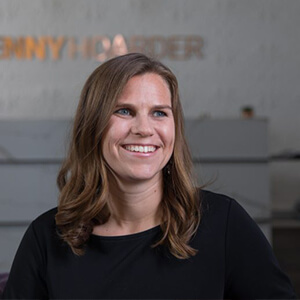
Alexis is a veteran blogger that’s been in the content game for well over a decade. She runs The Write Life, a blog and media brand that serves writers, and was responsible for building the blog content strategy that grew the finance site, The Penny Hoarder, to millions in monthly readers and revenue. Before that, she built a content marketing agency and worked as a journalist for the Houston Chronicle and U.S. News & World Report. To say she knows a thing or two about blogging would be an understatement.
When I asked Alexis what her single best piece of blogging tips and advice is, she shared:
“Grow your email list! Collect emails from day one. Even if you don’t send emails initially, your list will be a huge asset to tap into over time.“
“It’s more valuable than any social following, because you own the emails and can reach people in their own inbox (rather than hoping a network like Facebook will show your post to your community). It’s also an effective way to build trust because you can add a personal touch.”
Blogging Tips & Advice Part 3: Making Real Money from Your Blog
Leverage your personal strengths to monetize your blog early on with a service offering. As you grow, begin testing out sponsorships, affiliate promotions and eventually your own digital (or physical) products.
Don’t just flip on Google AdSense, place a couple of banner ads, implement an affiliate link or two and sit back to see how much revenue your blog can generate. Instead, start laying the foundation for soon launching your own product or offering a service that draws from the skills and experience you have.
Even if your blog audience is small, you can work directly with those readers to help solve meaningful challenges in their lives (within your niche)—and generate sizable amounts of revenue as a byproduct of your coaching work. That coaching program can formulate the basis of an eventual online course that can become a truly passive source of income.
However you decide to monetize your blog, treat it as a real business—and focus on the things that drive revenue (and don’t forget to do your blog taxes too).
28. “If you want your blog to actually make real money, you have to treat it like a real business.” – Preston Lee, Millo.co
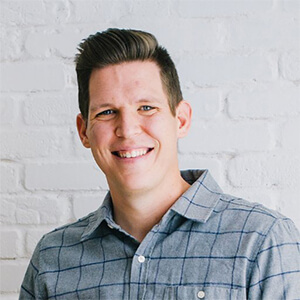
Preston’s been a good friend of mine for years, as we’re both solo business owners, running similar blogs that overlap a lot in content for freelancers and bloggers. He’s been a guest on my podcast multiple times, we used to co-host a show together, and he’s absolutely killing it with generating multiple six-figures in revenue within his niche of freelancing-related content.
When it comes to monetizing a blog, he’s one of the most creative people I know. Here’s his best blogging advice for making money from your blog:
“Focus on actually treating your blog like a business. Now, if your blog is an experiment, or a hobby, or just a fun thing you want to do, that’s fine. But if you want it to be some sort of business or revenue-generating side hustle, if you want it to actually make money, you have to think about it like a business.“
“That sounds so obvious, but it can be so easy to get hung up in the questions like… how many times a week should I post? What should I write about? How long should my blog post be? Is my logo the right size? Are my colors good? … and all sorts of things about the layout of your blog. Don’t get me wrong, these are important, but it can be so easy to get caught up in all of that, instead of focusing on the things that actually drive revenue.”
“You don’t have to sell out in order to care about revenue. If you’re running a business though, that’s what running a business really is. If you don’t focus on revenue, you’re running a hobby, or you’re just experimenting. The day I started treating my blog like a business—as something I wanted to actually make money from, instead of just a fun hobby that also made money, everything changed for me.”
29. “If you want to launch a blog as a business, go backwards. Figure out how it’s going to make money first and start creating content that’ll get you there.” – Tim Soulo, Ahrefs

Now the CMO of the SEO tool suite Ahrefs, Tim got his real start into blogging as just a simple bet with a friend about how much traffic each of them could generate to a totally new blog within six months. That little experiment led to a whole lot of readers for Tim, and as he began monetizing his audience, he was recruited to join the team over at Ahrefs, where he’s been leading the team responsible for a lot of the company’s growth in traffic and revenue over the past few years. For Tim, his ultra low blogging costs has already paid off with a huge reward in his successful career.
During our interview for my podcast, I asked Tim to share his best blogging tips and advice when it comes to launching a blog that you eventually want to monetize. Here’s what he had to say:
“I didn’t have any goal other than trying to generate traffic. And traffic is a super vanity metric, because the number doesn’t mean anything until you try to monetize it. So my advice for people who want to launch a blog as a business, is to go backward. Figure out how you’re going to make money blogging first. If you’re going to make money by promoting affiliate offers, search for things that are related to those affiliate products and see who is ranking there, what they are promoting, and what your competition is.”
“If you want to launch your own information product, I would think about making an MVP: a minimum viable product. Think about something small that you can make, like a series of just three videos, or just one short eBook that costs $5 to $6. Try to sell that first, then work backward. Now you have that eBook or smaller product, so what kind of content do you have to publish—and how would you funnel people from your content into that product?”
30. “Figure out how to leverage your skills and experience to charge more for your products or services right out the gate.” – Adam Enfroy, Blogger and Affiliate Marketer

Adam is a master of guest blogging to grow his audience, and even more impressive—he was able to generate more than $10,000 in revenue from his brand new blog within his first 90 days of launching the site. Since then, he’s been rapidly scaling his traffic, guest posting volume and revenue all in the right direction. As someone who’s been slowly building momentum with my blog over the last six years, seeing what Adam’s done in just one year has been mind-blowing.
I asked him to share his best piece of blogging tips and advice with the listeners of my podcast who want to generate revenue from their blogs, and here’s what he had to say:
“A lot of bloggers want to make money with passive income sources right away. The word ‘passive income’ is used a lot in this space, but I want to stress that affiliate marketing and placing blog advertisements really takes 50,000 to 100,000 visits per month to start making real money.”
“If you’re just starting out, and you don’t have a ton of traffic yet (and you’re building up your domain authority), really hone in on your niche. Think about that audience revenue potential. Who would pay you for consulting? Can you leverage your professional experience on your blog and use your personal brand to charge more money right out of the gate? If you’re getting 10x less traffic when you start, then you’re going to need to charge 10x more to make the same amount as from these more passive streams can eventually be.”
31. “Make the medium you’re blogging in a jumping off point to other products or services you can offer.” – Darren Murph, Guinness World Record-Holding Blogger

As the Guinness World Record Holder for the title of “world’s most prolific blogger,” Darren’s credentials speak for themselves. Right out of college, he landed a job as a reported a the online tech publication, Engadget, where he spent many years publishing over 20,000 articles and eventually rose to become the managing editor. Since then, he’s gone on to work at global brands like Dolby, TechRadar, The Points Guy and now heads up remote culture at GitLab.
When asked to share his best blogging advice with those just starting their writing careers and looking to eventually grow a business, here’s what he had to say:
“The real thing you should focus on, if you want to break away and make blogging or writing, a cornerstone of your livelihood—is to make the medium you’re using a jumping-off point to other services you can offer.”
“Don’t think about blogging as strictly meaning your written words themselves have to sell something—because you’re forcing yourself into a really narrow niche with a lot of competition. If you use your blog as a jumping-off point to other products or services you can offer, that’s where the real magic happens—and quicker.“
Need Catchy Blog Title Ideas?
Try my free AI-Powered Blog Title Generator Tool to get dozens of SEO-friendly headline ideas to make your blog posts stand out today.
32. “Want to build a real business around your blog? Have people on your team that are committed to you over the long haul.” – Jon Morrow, SmartBlogger

Ranked on just about every list of the world’s top bloggers you’ll ever find, Jon Morrow has been running his site, SmartBlogger for the better part of a decade—where he teaches beginning and intermediate bloggers how to take their business to the next level. That’s translated into a multi-million dollar annual business for Jon.
During our interview for my podcast, Jon shared this bit of actionable blogging tips and advice with those who are ready to take their revenue to the next level:
“Invest in a real team. A lot of businesses, a lot of blogs, run off this motley crew of outsourcers, where you have a few part-time people doing this and doing that. I have one employee now that’s been with me since the first day. I have multiple other employees that have been with me for years.”
“Is that more expensive? Yes, it is. But the enormous benefit. is they know exactly how everything is supposed to be done. They also have a sense of ownership in the company, and a sense of ‘this is my home and I want things to be right’ that translates into much higher quality output.”
“The amount of oversight that’s required is dramatically less with a great team. The profit is dramatically higher for each of those people as well. So it’s a higher investment, but it’s a much higher reward. The amount of stress that it relieves—of knowing you have people around that are committed to you over the long haul and that are genuinely doing a good job at what they do—the sense of peace you get from that as an entrepreneur, is something that you just can’t put a price tag on. It’s a beautiful thing.”
33. “Get clear about who your ideal customer is.” – Adda Birnir, Skillcrush

After launching her tech education startup, Skillcrush, Adda spent almost all of her time developing a deep understanding of who her customers were—and how they could do a better job of using content to attract more of that right audience to come in and learn how to code from their various bootcamp courses.
When asked about her single best piece of blogging tips and advice, here’s what Adda had to share:
“The most important thing is that you have to get clear about who your customer is, and then get attached to the customer, not the problem.”
“If you want to execute this perfect idea you have in your head, I would not call that a business. That’s a project. Which is fine! There are lots of people who do artistic projects, and there’s nothing wrong with that, but it’s important to not conflate that with what a business is.”
“A business is identifying a customer, understanding their problem, then solving that problem. Having a solution in search of a problem is the most common mistake. 90% of people starting blogs or businesses have a solution in mind and they’re searching for someone with the problem. It’s going to lead you down a bad path. All of our success at Skillcrush is because we focus on our customer.”
34. “Being successful at blogging requires you to get outside of your comfort zone.” Nathan Barry, ConvertKit

Long before he founded ConvertKit, the wildly popular email marketing tool suite designed for bloggers and creators, Nathan was an avid blogger and product designer in his own rite. He ran a six-figure business around his blog, selling eBooks, online courses and other digital products to his audience that tuned in for his in-depth content related to product design.
During our interview for my podcast, here’s what Nathan had to share when asked about what his best blogging tips and advice would be for creators that want to monetize their sites, but are having a hard time overcoming the fear of selling:
“Once those initial sales start to come in, it becomes pretty addictive, and it’s easy to overcome the fear of cold emails and cold calls and stuff like that. Once you get results, you realize all the work is worth it.”
“Something that helped me a lot with overcoming that initial fear though, is that I did theatre in high school. That helped take me from a super shy kid to acknowledging that sure, I still don’t want to sell… but I have the ability to turn on that performance side of me that I’ve worked on, and I can use that experience I had to get outside my comfort zone and be a better salesperson, talk to people at conferences, or make big partnerships happen.”
Blogging Tips & Advice Part 4: Leveraging Powerful Tools and Techniques
While the tools and techniques you employ on your blog aren’t everything, they definitely matter.
Having the right blogging tools for the job can save you a huge amount of time (and effort)—and using the right techniques to grow your blog in conjunction with the right tools, can really multiply your efforts and help hit your goals faster.
Another piece of my best blogging advice? Don’t just rely on just one technique to drive traffic to your blog either. Look for ways to diversify your traffic sources, revenue channels and content ideas, so that you’re not solely dependent on just one set of channels to keep your blog running.
Now, let’s talk about some of the top tools and techniques in use by the world’s top bloggers today.
35. “Re-marketing is one of the most effective and underrated ad techniques for bloggers to employ today.” – Brian Jackson, woorkup

Veteran WordPress blogger and content marketer, Brian Jackson, has been offering cheap hosting plans, launching blogs, building plugins and scaling traffic for startups (like Kinsta where they offer some of the best hosting plans on the market) for well over a decade. A man with many profitable side projects and blogs with hundreds of thousands of monthly readers under his management, it’s safe to say Brian knows a thing or two about getting—and converting readers.
During our chat on my podcast, I asked Brian to share a lesser-known marketing tactic that bloggers can use to better monetize their sites. Here’s the blogging tips and advice he had to tell us:
“Obviously I’m a big fan of SEO. But SEO has its ups and downs, so I’ve had good months and I’ve had bad months. There’s no way to get around that when you’re just doing SEO. I always recommend people figure out other ways to generate traffic too, so you can supplement any dips you have with your SEO.”
“I’d say that SEO is still number one, by far. But another good thing I still don’t see people taking advantage of enough (and I don’t know why) is re-marketing. Re-marketing is something that works so well for us at Kinsta. It’s one of the most effective ad techniques.”
“Lead generation ads can get costly quite quickly if you’re not good at them, and if you go the AdWords route, that can get very expensive too. But re-marketing on Facebook and Twitter to the people who’ve already hit your blog and haven’t converted to anything yet, is so much cheaper as far as clicks go. I still see today that the conversion rate is so much higher too.”
36. “My entire blog business is built on using just three simple online tools.” – Mike Pearson, Stupid Simple SEO

This side hustling blogger took his skills and experience working in marketing and blog SEO with large brands—and parlayed that into a rapidly growing niche blog and a more than $55,000 course launch during just one week, shortly after releasing his in-depth online SEO class. He’s a great example of how quickly you can monetize a blog if you’re intensely focused on creating high-quality solutions for your audience… even without having much traffic.
During our interview for my podcast, Mike got to talking about blogging advice in the context of the most mission critical tools he uses to monetize his site. Here’s what he had to say:
“From a tools perspective, I couldn’t live without ConvertKit, or Teachable (which is where my course is hosted and where I have all my content). Another tool I use is Thrive Architect, which builds all my landing pages, which is how I collect email addresses and eventually sell my course.”
“Those three tools are what my entire blog business is built on.”
37. “It’s your job, as somebody who’s running a blog, to speak directly with your readers.” – Shane Parrish, Farnam Street

Similar to James Clear (one of our contributors), Shane is one of the most prolific thinkers and writers I’ve ever had the pleasure of interviewing on my podcast. He shares incredibly thought-provoking essays and actionable life advice on a range of topics related to personal finance, productivity and purpose—for more than 1 Million monthly readers.
When asked to share his best blogging tips and advice for how he’s created such a close-knit community from his email list, here’s what Shane had to say:
“Open rates just tell you how many people opened a given email on a given day. How long someone’s been with you is irrelevant if they’re not opening your email. And if they’re opening your email and they’re not interacting with it, then you’re probably not adding as much value as you ought to be adding—so your click-through rate is arguably more important.”
“These are also signals of the value that you create. They’re not 100% accurate: they’re a map, not the territory. The ultimate way to figure out how you’re doing is to talk to people on the ground.”
“The map/territory problem is something we talk about on Farnam Street: so often we use maps to guide us and we think it’s the territory but it’s not. Examples of that are balance sheets or income statements in businesses, or online dating profiles—that’s a map of who the person is. Anyone who’s been online dating meets a person and realizes that maps and territory are often very different things.”
“It’s your job, as somebody who’s running a company, to touch the territory… and so often we insulate ourselves from that. That’s where the problems come from. We make decisions in isolation; we make decisions without knowing what people are thinking or feeling—and that causes more and more problems.”
“What happens is that those problems consume us: they make us busier, they create anxiety. We spend more and more of our time solving or fixing problems that we’ve created through a lack of thinking, when had we touched the medium and thought about the problem in a more holistic or three dimensional way, we could have avoided a lot of these problems.”
38. “Take the marketer’s approach to selling on your blog.” — Sujan Patel, Mailshake and Web Profits
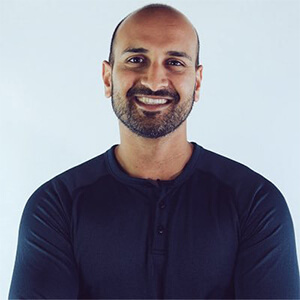
Serial entrepreneur Sujan Patel juggles a whole lot of projects at a time—ranging from his sales email software, Mailshake, to keeping a foot in the door at his content marketing agency and still somehow finding time to blog for both his own site and also top publications like Inc and Entrepreneur. When it comes to blogging, he’s built multiple businesses on the back of creating industry-leading content.
Here’s Sujan’s best piece of blogging advice when it comes to providing more value to readers and better monetizing your blog:
“Since 2014, I’ve been consistently building my personal brand—and sales land in my lap, now. I can write about stuff that I know my target customers are having problems with and want to learn.”
“So instead of sending a cold email to someone selling something, or explaining this long-winded thing of what that friction point is, what if you just send them a reply like… Hey, I know you have a problem with using all these different pieces of software. It’s fricking annoying. Here’s an article I wrote about how to fix it.”
“When you send an article versus explaining it individually, it has a different weight. Those types of things have really helped me increase sales and provide value, come off less sales-y, and my net worth has increased because a lot more deals come to us. We’ve taken much more of a marketer’s approach to sales, because I’m not a sales guy. I’m a people-pleaser. I want to make sure that person’s happy. I’ve applied that approach to sales in all of my work, and it’s worked really well for me.”
39. “Give, give, give. Show people love, respect and link to their stuff as much as you can before making an ask of them. That’s how you build a real relationship.” – Aaron Orendorff, iconiContent

Aaron has written for (and worked with) some of the world’s leading brands on crafting their content strategies—ranging from Shopify to Intuit, Facebook, Salesforce and more. His success as both a blogger himself, and a consultant for Fortune 500 companies comes down to one thing more than all else… building real relationships.
Here’s what Aaron has to say when asked to share his best blogging tips and advice:
“When I was first starting out, I was gunning for landing a guest blog post on Copyblogger. I was in love with their chief copywriter at the time, a guy named Damien Farnsworth, who is just a phenomenal writer and storyteller. He can do direct response, the dude does it all. I stalked the hell out of him! Not just everything he did on Copyblogger – I went to his own site, The Copybot. And then I found out he had a personal personal site, and so I went there, and it just happened to be he was writing about theology and the same people I knew from back in the day, and stuff.”
“So I’d share and comment on everything. There was one point where he wrote this fantastic post, Fifteen Damn Good Lessons From Fifteen Dead Copywriters. I loaded up every single one of the lessons into Buffer and just dripped it out over time. By the ninth thing with him tagged in it, he finally wrote me back and was like, “I see what you’re doing here.”
“And that was the open door. I ended up hiring him to coach me early on, so I paid the guy money. I grew a whole lot, but I was giving and giving and giving until about six months, maybe a year into our relationship, where I finally said, “Hey, man, I just finished a piece that I think would be perfect for Copyblogger. Would you mind checking it out?”
“And the beautiful thing about that was that he accidentally emailed me the entire string back from between he and his editor. And it all came down to—it’s a topic we’ve done before, yeah, it’s pretty good. His editor asked him, is he a decent dude that deserves a chance? And Damien was like, yep, he is.”
“That was a huge lift-off. What I learned from that, and what I’ve continued to learn, is to give, give, give–show people love, show them respect, comment on their stuff, link to their stuff as much as you can–and wait. For whatever that ask is. And then be a decent person when you finally do.”
40. “Read quality, all the time, every day. Then get good at writing, yourself.” – James Altucher
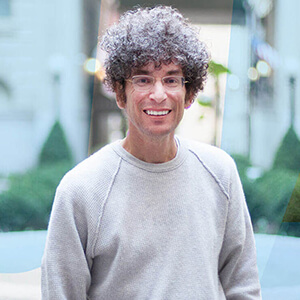
James has built several million-dollar businesses over the past few decades, and he’s crashed a few of them straight into the ground too. But one thing he’s always been consistently great at, is writing. Today, James runs a massively popular blog, publishes regular books and hosts a top-10 iTunes ranked podcast that reaches a combined millions of people every month (and generates a substantial amount of income). If that’s not motivation to try starting a podcast of your own, then what is?
When asked to share his best blogging advice, here’s what James had to say:
“The most important thing when launching a blog, is that you want to get good at writing. Read a lot, every day. Don’t just read BS blogs out there, read the best books in history to learn how to be a good writer. Read quality, all the time, every day. Then write. And make sure you’re writing something that – even just a little bit – is different from something anybody else has ever written. Or you say something in a different way.”
“I’ll give you an example. I love Seth Godin’s blog. I highly recommend people check them out. See these top blog examples, too. But he seldom tells personal stories – that’s just his way. So sometimes I notice, some of my ideas might intersect with some of his ideas – but I tell personal stories all the time. I have my own unique way of writing – which you can only develop if you write every single day, and again, it’s going to take you years and years and years, so you have to learn to celebrate small successes along the way.”
Blogging Tips & Advice: Final Thoughts on Growing a Profitable Blog in 2023
There are a lot of blogging tips and advice to take in here, with tons of actionable steps you can take—from many of the world’s most successful bloggers who’ve become huge success stories within their respective blog niches. I’m constantly updating this compilation of tips, based on my own continued experiments both here and with side projects like my food blog, VeganTable, over on SmartWP and with my girlfriend’s blog, Vegan Anj—so stay tuned for more advice!
If this all feels a bit overwhelming, bookmark this list and use it to come back to when you’re in need of some new handy blogging tips.
As your blog grows and you reach new roadblocks, come back and pick out the right blogging tips and advice that’s most relevant to you at the time. Or, you could make it a weekly habit to pick a new idea out of this list and experiment with how to implement the advice into your own blogging workflow.
And if you haven’t yet launched your blog, remember the seminal blogging tips and advice we started out with…
Don’t wait, start right now.
Figure out what your strengths are, how you can add value to an audience (through a blog), get started and take small steps every day that move your blog forward.
If you want a simple, straightforward guide to follow along with, then look no further.
Ready to Start Your Blog Today?
Check out my ultimate guide How to Start a Blog (on the Side) that’s been featured on Forbes, Inc and Entrepreneur.

104 replies to “40 Blogging Tips and Advice from Top Bloggers (to Grow Your Blog) in 2023”
What’s your affiliate link to the auto responder you use please?
Hey Chris! I use ConvertKit and absolutely love it (they have a free plan you should check out as a starting point): https://convertkit.com/?lmref=gW8kVA
I like the content very much helpful. Thanks for sharing with us.
You’re welcome, Dharmesh! 🙏
Some really good tips on this website. I still have no idea how to make money from a blog? Is the money coming from the product or services via conversion from the articles published?
Thanks
Dave.
Thanks, David! The money you make from a blog can come from many sources (most often by selling a product, service from your site or by hosting ads, making affiliate offer recommendations and such). Read through my (free) guide on how I monetize my blog here: https://www.ryrob.com/make-money-blogging/
Thanks, brother this really helped me.
Glad to hear that, Nashaa
Hello!! Useful blog. Thank you for sharing with us.
You’re welcome!
Your blog is very informative and I have learned many things from it. Thank you for writing this blog.
You’re welcome, Heather!
Its a great pleasure reading your post. Its full of information
🙏
Man Im way behind every one else on the Internet. Just found your blog today 🙂
Awesome tips but I fear I have to read the whole damn thing again. There are too many for my small brain! And many I haven’t seen before.
Haha! Take my advice and be kind to yourself… start small and build sustainable habits, set realistic goals, don’t get down on yourself for not being where others are in their journey—when you’re just starting this part of the journey, yourself. You’ll get there in a way that’s unique to you. Wishing you all the luck, Danny!
You blog is very nice. wish to see much more like this.
🙏
The way you wrote this content, is simply amazing, loved reading each and every point…. To become a successful blogger, one needs to be determined and hard-working.. Thanks for sharing..
Ah thanks for the kind words 🙂 good luck with your blog!
I didn’t go through the whole article yet but I already wanted to say thank you, what I’ve read and heard so far has been quite enlightening on many issues and doubts I’ve had on the road.
You’re so welcome, Maia!
I am really impressed read your blog. Actually, your blog article is very helpful and more informative. Thank for sharing your valuable information. Such an insightful and long post almost intimidating for us newbie bloggers. Grateful for the effort you took to write this post. Lot’s to think about and get going with. Thank you.
You’re welcome, Sagar! Good luck with your blog 🙂